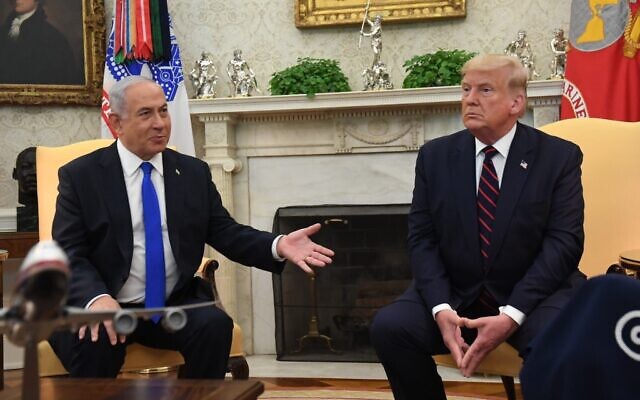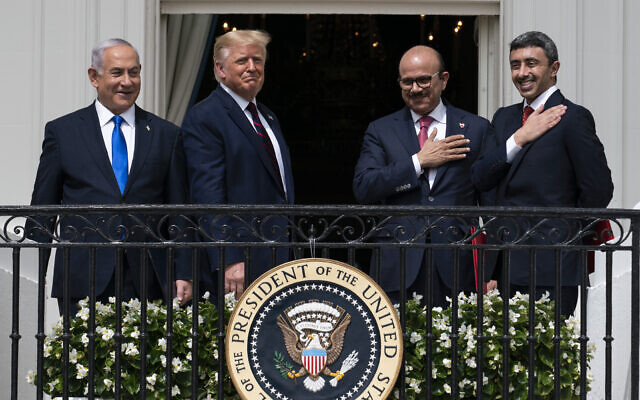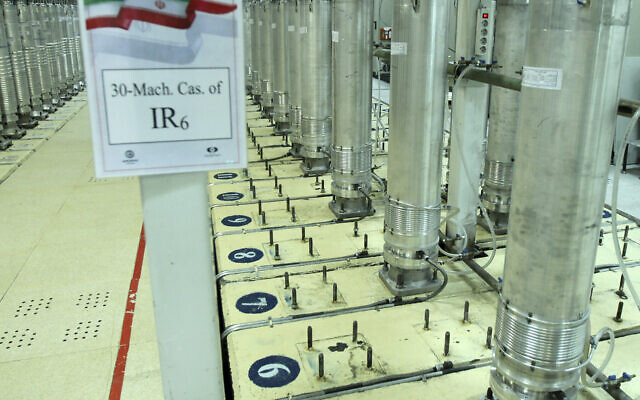NEW YORK — Roughly four years ago, J Street was on the outside looking in as the newly inaugurated Trump administration began to draft its foreign policy agenda.
This would eventually include appointing an ambassador to Israel who called members of the liberal, pro-Israel lobby “far worse than Kapos,” a reference to Jews who were forced to collaborate with the Nazis during the Holocaust. David Friedman went on to apologize for the 2016 op-ed during his confirmation hearing and even met with the advocacy group several months later, but J Street’s access and influence in the Trump administration largely ended there.
The group established 13 years ago to galvanize members of Congress and the American Jewish community around diplomatic initiatives promoting a two-state solution to the Israeli-Palestinian conflict quickly found itself stonewalled by the Republican administration, which initially refrained from backing the long-accepted paradigm for peace at all.
During his four years in office, US President Donald Trump recognized Jerusalem as Israel’s capital, moved the US embassy there, recognized Israeli sovereignty over the Golan Heights, slashed aid to the Palestinian Authority, ended funding to the UN agency for Palestinian refugees, repudiated a State Department position deeming settlements illegal, unveiled a peace plan that envisions Israel’s annexing those West Bank communities and on Thursday issued guidelines requiring US exports from Israeli controlled areas of the West Bank to be labeled “made in Israel” — all positions that J Street opposed.

US President Donald Trump (right) and Israeli Prime Minister Benjamin Netanyahu during a bilateral meeting in the Oval Office of the White House in Washington, DC, September 15, 2020 (SAUL LOEB / AFP)
While there may be slight differences between the liberal lobby’s positions and those taken by President-elect Joe Biden, the two largely speak the same language when it comes to Israel as well as broader Middle East issues. J Street endorsed Biden and the candidate met with the group during the campaign, as he did several times as vice president. Biden, however, blocked a J Street-led effort to include to include the word “occupation” to describe the situation in the West Bank for Palestinians in the Democratic Party platform.
“It’s nice to be having conversations with a group of people to who are on their way to having positions of power,” J Street president Jeremy Ben-Ami told The Times of Israel in a Tuesday interview. “Instead of just schmoozing, these are conversations about how we can impact actual policy.”
With a Democrat back in the White House, Ben-Ami said he expected a return to a more “balanced” American approach on the Israeli-Palestinian conflict along with a reentry to the Iran nuclear agreement from which US President Donald Trump withdrew in 2018.
Seat at the table
The J Street president admitted to “breathing a little easier” after Biden’s victory, but said he was under no illusions that his group’s agenda would be anywhere near the top of the president-elect’s list of priorities.
Ben-Ami noted the difference between the current period and the last time a Democrat took office, in 2009. Just months before former president Barack Obama’s inauguration, then-prime minister Ehud Olmert and Palestinian Authority President Mahmoud Abbas held negotiations. Those talks were widely believed to have gotten as close as the two sides ever came to reaching a peace agreement to end the conflict before they fell apart due to Abbas’s failure to respond to Olmert’s offer and the Israeli premier’s looming corruption probes, for which he later landed in prison.

J Street Executive Director Jeremy Ben-Ami addressing the group’s conference in Washington, March 21, 2015. (Courtesy JTA/J Street)
“There was a sense that we had come so close, and let’s just try and finish this,” Ben-Ami said.
On his first day in office, Obama appointed former Senate Majority Leader George Mitchell as special envoy for the Middle East and his first calls to foreign leaders went to Olmert and Abbas.
“We’re now in a completely different world, and you won’t see the high level of focus on the issue,” he said. “It’s not in the top 20 that the administration will have to deal with.”
But unlike the start of Obama’s term, when J Street was little known and viewed by many as outside the consensus in Washington on Israel, Ben-Ami said his group is now the “preeminent voice” on such issues in the Democratic party, endorsing a majority of its Congressional caucus.
“We no longer have to introduce ourselves and ask for a seat at table, but are able to be helpful in shaping policy and get it the kind of support it needs from Congress or from the Jewish community,” he said.

US President Barack Obama (right) meets with Prime Minister Benjamin Netanyahu in the Oval Office of the White House in Washington, November 9, 2015. (AP/Andrew Harnik)
Balancing act
While Ben-Ami doesn’t expect the Israeli-Palestinian portfolio to get much presidential attention during Biden’s “first week or even first year in office,” he did express hope that the administration would “return the US to a more traditional, bipartisan and balanced approach on this issue.”
This includes restarting relations with the PA and releasing aid earmarked for Ramallah that has been held up by the Trump administration against the backdrop of Abbas’s boycott of Washington following the 2017 US recognition of Israel’s capital.
Biden, during the campaign, also pledged to reopen the Palestine Liberation Organization’s diplomatic mission in Washington and the US Consulate in East Jerusalem; but on those issues, the new administration will need approval from Congress and the Israeli government, respectively.
Ben-Ami said his group would also advocate for “a renewed American intent to oppose steps taken by Israel that make the two-state outcome less likely” — a reference to Israeli settlement expansion in the West Bank, which the Trump administration avoided criticizing and even worked to normalize.

The PLO’s envoy to Washington Husam Zomlot addresses J Street’s 2018 national conference on April 16, 2018, at the Omni Shoreham Hotel in Washington, DC. (Screen capture)
J Street will also push for an executive repudiation of the Trump peace plan, which was welcomed by Prime Minister Benjamin Netanyahu and rejected by the Palestinians, Ben-Ami said, adding that a Biden White House should instead promote a return to principles outlined by the Clinton, Bush and Obama administrations.
He recognized that some steps will take more time to carry out and spoke in favor of leveraging gestures to the Palestinians in exchange for a commitment from Ramallah to cease its practice of monthly stipends to security prisoners.
As for gestures the Biden administration could make toward Israel, Ben-Ami pointed out that Jerusalem is already a recipient of $3.8 billion dollars in US military aid and that “righting some of the wrongs of the Trump era should not require more gifts to Israel.”
But he did speak in favor of “building off of” the recent normalization agreements Israel signed with the UAE and Bahrain, saying further deals could be used to address the Palestinian issue as well.

From left to right: Prime Minister Benjamin Netanyahu, US President Donald Trump, Bahrain Foreign Minister Abdullatif al-Zayani and United Arab Emirates Foreign Minister Abdullah bin Zayed al-Nahyan are seen on the Blue Room Balcony after signing the Abraham Accords during a ceremony on the South Lawn of the White House in Washington, September 15, 2020. (AP Photo/Alex Brandon)
Compliance for compliance
An issue that is more likely to capture the next administration’s attention is the effort to prevent Iran from acquiring a nuclear weapon. J Street was among the most vocal groups in support of the Obama-brokered Joint Comprehensive Plan of Action and Ben-Ami said his group hopes to work closely with the president-elect to ensure a swift reentry into the multilateral accord opposed by Israel.
“The goal is a nuclear-free Iran that is not a destabilizing power, but in order to begin the process of strengthening the accord, the US, which violated its commitments, must first come back into the agreement,” Ben-Ami argued.
“Compliance for compliance,” he said, using the same phrase employed by the Biden campaign, which pledged a return to the JCPOA.
However, the J Street president clarified that the US is the party that must take the first step and argued that it should not be conditioned on Iran rolling back its recent uranium enrichment.

Centrifuge machines in the Natanz uranium enrichment facility in central Iran, November 5, 2019. (Atomic Energy Organization of Iran via AP, File)
Ben-Ami maintained that the US only has the legitimacy to address such violations once it has returned to the agreement.
He lamented that Biden’s desire to “lengthen and strengthen” the JCPOA would be much more difficult given the hardening of positions in Iran, which will hold a presidential election in June 2021.
“This is the sad result of the horrific Trump administration policy that empowered less moderate forces in Iran and legitimized the argument that the US shouldn’t be trusted,” he said. “That’s why it’s so important for the new administration to try and do what it can to make the case that the US can be trusted and that it acts in accordance with the agreements it has signed.”
 RSS Feed
RSS Feed















 November 20th, 2020
November 20th, 2020  Awake Goy
Awake Goy  Posted in
Posted in  Tags:
Tags: 













